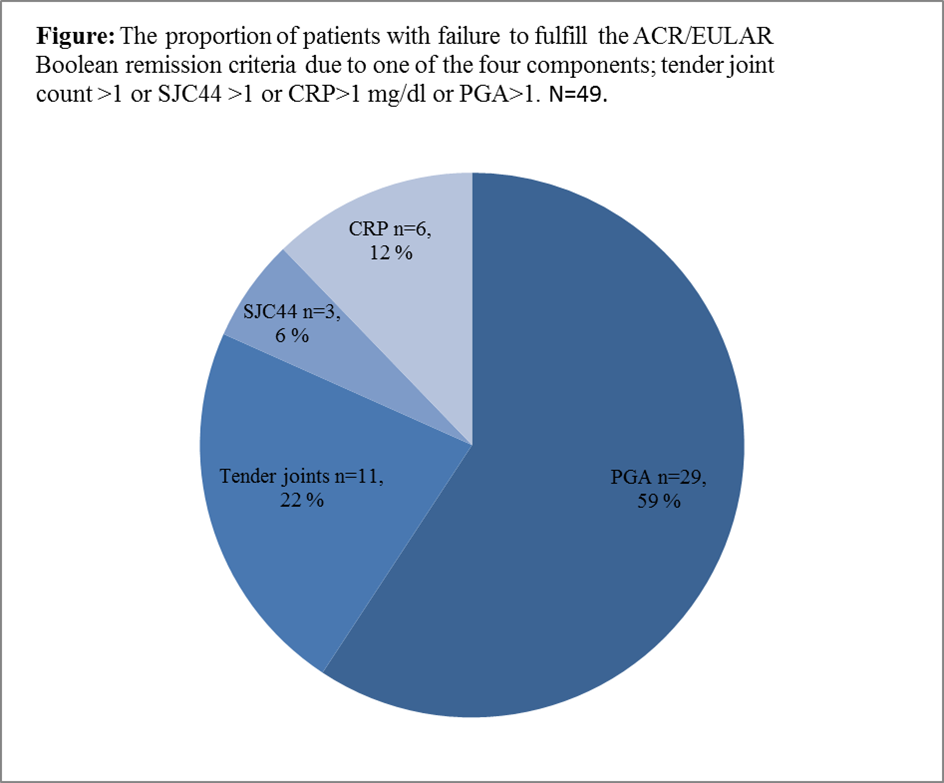Session Information
Date: Tuesday, November 12, 2019
Title: 5T114: RA – Diagnosis, Manifestations, & Outcomes IV: Outcomes (2846–2851)
Session Type: ACR Abstract Session
Session Time: 4:30PM-6:00PM
Background/Purpose: Abrogation of inflammation is important to prevent irreversible joint damage and maximize health-related quality of life in early RA patients. The ACR/EULAR Boolean remission criteria have the most stringent remission definition.(1) It has been reported that patient global assessment (PGA) is the variable most commonly scored above the cut-off in patients who almost fulfill the ACR/EULAR Boolean remission criteria.(2) Our objective was to assess which components of the ACR/EULAR Boolean criteria that most often limit attainment of remission in modernly treated early RA, and quantify the extent of subclinical inflammation in these patients.
Methods: DMARD-naïve early RA patients included in the treat-to-target ARCTIC trial were followed by a strict tight control regime aiming for DAS remission and no swollen joints, with an additional target of ultrasound remission in half of the patients.(3) Examination of all patients included 44SJC, Ritchie articular index (RAI), laboratory tests, patient reported outcomes included physical function (PROMIS), ultrasound (US) of 32 joints and magnetic resonance imaging (MRI) of the dominant hand and wrist (scored according to RAMRIS). Patients with complete clinical data at the 2-year follow-up visit were included in the current analyses. We assessed the proportion of patients fulfilling ACR/EULAR Boolean remission (based on 44 joints) and the proportion of patients fulfilling three out of four remission criteria, and in such cases, which were the limiting factors. We compared physical function and imaging inflammation (assessed by US power Doppler score, US grey scale score, MRI synovitis and bone marrow edema) in patients reaching complete ACR/EULAR Boolean remission to patients not reaching ACR/EULAR Boolean remission due to the most often limiting factors. Chi2 test and Wilcoxon rank sum test were used for the comparisons.
Results: Of the 203 patients included, 62% were females, mean (SD) age was 52 (13) years, and 81% were ACPA positive. ACR/EULAR Boolean remission was achieved by 112 of 203 patients after 24 months (55%), while 49 (24%) fulfilled three of the four remission criteria. Among these 49 patients, the major limiting factor for not reaching remission was PGA (n=29, 59%), with tender joints as the second most common limiting factor (n=11, 22%) (Figure). In patients not achieving remission due to PGA, the median [IQR] PGA value was 3.1 [2, 4.4]. Subclinical inflammation measured by ultrasound and MRI was not significantly different for patients in ACR/EULAR Boolean remission compared to patients not fulfilling these criteria due to PGA and /or tender joints (Table), but the latter reported more subjective symptoms such as fatigue and impaired physical function.
Conclusion: PGA and tender joints are the variables most often limiting patients from achieving ACR/EULAR Boolean remission, also in a treat-to-target setting with high remission rates. The level of subclinical inflammation is not elevated in these patients compared to patients in ACR/EULAR Boolean remission. Further research is still needed to assess which clinical remission criterion is best suited to guide treatment.
To cite this abstract in AMA style:
Sundlisater N, Aga A, Sundin U, Hammer H, Uhlig T, Kvien T, Haavardsholm E, Lillegraven S. Limiting Factors of Reaching ACR/EULAR Boolean Remission in Early RA Patients Treated According to Current Recommendations [abstract]. Arthritis Rheumatol. 2019; 71 (suppl 10). https://acrabstracts.org/abstract/limiting-factors-of-reaching-acr-eular-boolean-remission-in-early-ra-patients-treated-according-to-current-recommendations/. Accessed .« Back to 2019 ACR/ARP Annual Meeting
ACR Meeting Abstracts - https://acrabstracts.org/abstract/limiting-factors-of-reaching-acr-eular-boolean-remission-in-early-ra-patients-treated-according-to-current-recommendations/


